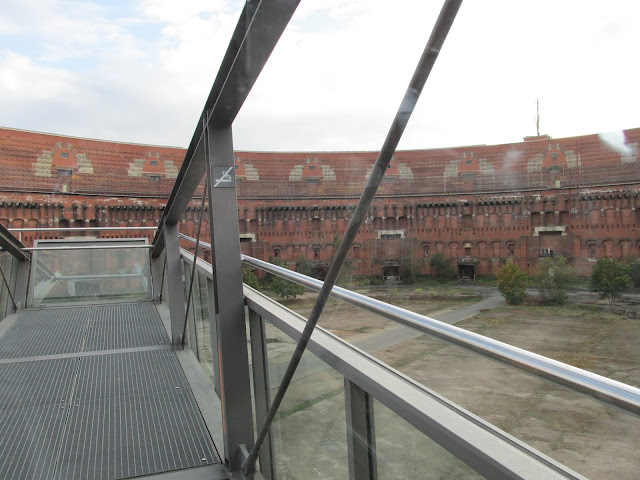What a strange title for the exhibit at the Dokumentationszentrum set
amid the 4 square km grounds of the Reichsparteitagsgelande that 80+ years ago were the site of those horrifically amazing NSDAP
rallies. Nuremberg was ground zero
for Hitler in his rise to power.
Here he held his first rallies; here his thugs managed to unseat the
Lord Mayor who refused to issue a second permit for an NSDAP rally after the
first one ended in a bloodbath; here he implemented the Nuremberg Laws with their severe restrictions of Jews, and here he molded a party that would gain
increasingly vicious traction across all of Germany and much of Western
Europe.
It's no coincidence that Nuremberg is where the famous
post-war trials were held to bring to justice the most egregious perpetrators
of 'crimes against humanity' and 'crimes against peace.' And, finally here is where the worst of
them were hanged on October 16, 1946.
We both felt it was important to include Nuremberg on our tour of
Germany . . . what does this city feel like now? How have today's Nurembergians dealt with this legacy? How can a city ever recover from a history like this?
But first the site of the famous Nuremberg trials.
Courtroom 6 where the trials were held is only open to the public when no trial is being conducted there. Today it was not open, but the rest of the exhibit was, complete with an audio guide.
It doesn't appear to either of us that this is any sort of apologist effort on the part of the Germans. Neither does it have a 'mea culpa' tone; it is, with typical German efficiency, a narrative of the preparation for the trials, the multinational cooperation (the US, France, GB, and Russia), the judicial process, and the conviction results. Given the diverse judicial imperatives of the four major countries, it is quite amazing that the trials went off as smoothly as they did. Much of the evidence had been destroyed not to mention the millions of witnesses.
One interesting aspect of this was the defense claims that the Allies bore a similar if not comparable level of culpability for their 'crimes against humanity' with the frequently-cited dropping of the bombs on Hiroshima and Nagasaki. The bulk of those victims were civilians.
It's a sobering exhibit . . . then we're off to the park.
It's a sobering exhibit . . . then we're off to the park.
*******************
The park is several kilometers south of the city and the
site of concerts, outdoor events, and family outings. There is a small lake, miles of bike and walking paths, a symphonic venue, and
the 'museum'. Our guide book states that there has been no small amount of controversy surrounding the conversion and uses of this land.
A map of the whole complex.
This is another dimly lit exhibit (all red and black) with a painstakingly-detailed narrative of Hitler's rise to power and his end. It is almost impossible to comprehend the monumental ego and colossal evil of the man . . . here's a photo of a structure, never finished, that he was building to rival the Coliseum in Rome.
A very sobering ending . . . an installation of RR tracks with the names of the death camps on the wall. On the 21-meter rail bed are the names of 6,000 people who perished at the hands of the Nazis. Each name represented 1,000 people; were these tracks to have all the names of those who died in the camps, it would stretch over 4km, right into the center of the city.
Tomorrow we're off to Dresden, another city nearly leveled by Allied bombing at the end of the war. And 25 years ago Dresden was in East Germany . . .
Did we find answers to our questions about Nuremberg? Not sure . . . our host, Peter, feels the current government is somewhat lackluster, but our sense was that everyone lives pretty well (haven't seen one homeless person or panhandler). People look healthy and well-dressed, but it's hard to characterize them as happy. Efficient, clean, energetic - absolutely. Vibrant, warm, welcoming . . . mmmm . . . not really. But Germany is almost as different regionally as the US and perhaps what we're seeing is a regional persona attributable, perhaps, to Nuremberg's history, perhaps not . . .
We'll see what Dresden has to reveal!







No comments:
Post a Comment